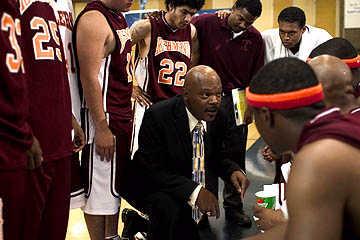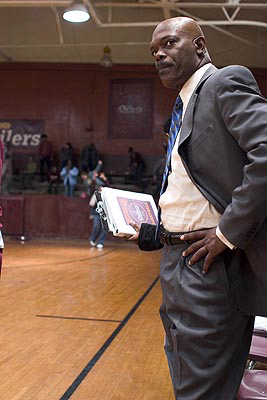

The latest inspirational sports movie based on actual events throws in a small twist. This time, succeeding academically is just as, if not more important than success on the court. The events portrayed in the film took place in 1999 in Richmond, California, where high school boys basketball coach Ken Carter forfeited games for the Richmond Oilers because his team was failing their classes. At that point, they had an undefeated record. Coach Carter has a great message missing from most other genre movies - while students may be good at sports now, achievement and academics will determine their future. To this end, they should use their skills on the court to help them get a college scholarship so they can escape a life in Richmond, where men are not likely to graduate. If they do, they can look forward to things like jail.
Coach Carter succeeds primarily because of its star, Samuel L. Jackson (The Incredibles, Kill Bill Vol. 2), who gives a forceful performance. Carter is an imposing presence. He is always dressed in a coat and tie, and not afraid to dish out the punishment. He wants his student athletes (he points out the word "student" comes first) to strive for excellence in everything, and forces them to sign a contract whose provision include a minimum GPA and a dress code. Failure to adhere to the terms of the contract will result in dismissal from the team. Now, while it is a good performance from Jackson, it's not really anything out of the ordinary. This is the same, blustery, angry Jackson that late night variety shows sometimes parody. He jumps quickly from stoic silence to finely directed rage. The difference is that Mark Schwann (The Perfect Score, 35 Miles from Normal) and John Gatins' (Hard Ball, Summer Catch) humanizes Carter. He sees the failure of his students as a failure on his part, and it truly affects him. At some points, Carter is close to tears because he feels he has failed his students. At others, he argues passionately about the importance of education. This is not a message present in most sports films. This is standard Jackson, which is not necessarily a bad thing, and he alone elevates the story from stereotypical sappiness to heartwarmingly inspiring.
Director Thomas Carter (Save the Last Dance, Metro) probably needs to prune down the running time a bit. At two and one-quarter hours, Coach Carter feels a little inflated, due to Carter's (the director) desire to get into the minds of students. He wanted to show how Carter changed their lives, which meant delving into the lives of a few of them. Kenyon Stone (Rob Brown, Finding Forrester) finds himself increasingly at odds with his pregnant girlfriend (Ashanti) when he begins seriously looking at college as a post-high school option. Timo Cruz (Rick Gonzalez, Old School, Biker Boyz) realizes that his choices are either basketball or a life of violence. Carter's son Damien (Robert Ri'chard, Light It Up) transfers from a prestigious prep school to Richmond so his father can coach him. Each boy has his own problems he is dealing with, and Carter takes the rowdy undisciplined bunch and hones them into lean, academic, basketball playing machines with his tough love. He mines every single sports film and basketball cliché, but to his credit, he makes them work. The basketball scenes are decent if not a bit generic, but the real interesting shots are of the players studying in the library. Anybody watching Coach Carter will know exactly what to expect. The difference is that they don't feel as bored when it finally happens.